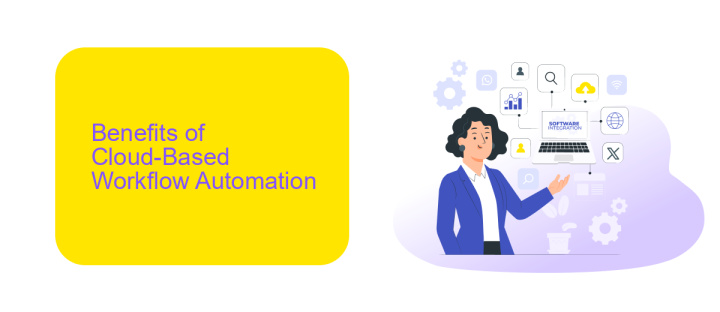Cloud Based Workflow Automation
In today's fast-paced digital landscape, businesses are increasingly turning to cloud-based workflow automation to streamline operations, enhance productivity, and reduce costs. By leveraging cutting-edge technologies, companies can automate repetitive tasks, optimize resource allocation, and improve overall efficiency. This article explores the key benefits, implementation strategies, and best practices for adopting cloud-based workflow automation in various industries.
Introduction
Cloud-based workflow automation has revolutionized the way businesses operate, offering streamlined processes and increased efficiency. By leveraging the power of the cloud, organizations can automate repetitive tasks, reduce human error, and focus on more strategic activities. This not only saves time and resources but also enhances overall productivity and scalability.
- Automated task management
- Seamless integration with existing systems
- Real-time data synchronization
- Enhanced collaboration and communication
- Scalability and flexibility
One of the key components of successful cloud-based workflow automation is the integration of various services and applications. Tools like ApiX-Drive facilitate this by providing easy-to-use solutions for connecting different software platforms. This ensures that data flows smoothly between systems, enabling more efficient and cohesive operations. By utilizing such services, businesses can achieve a higher level of automation and optimize their workflows to meet evolving demands.
Benefits of Cloud-Based Workflow Automation

Cloud-based workflow automation offers numerous benefits that can significantly enhance the efficiency and productivity of any organization. By leveraging cloud technology, businesses can streamline their processes, reduce manual tasks, and ensure that workflows are executed seamlessly. This leads to faster turnaround times, fewer errors, and improved overall performance. Moreover, cloud-based solutions often come with robust security measures, ensuring that sensitive data is protected and compliance requirements are met.
Another major advantage is the ease of integration with other tools and services. Platforms like ApiX-Drive make it simple to connect various applications, allowing for a more cohesive and automated workflow. This flexibility means that businesses can easily adapt to new tools and technologies as they emerge, without having to overhaul their entire system. Furthermore, cloud-based workflow automation provides scalability, enabling organizations to grow and expand their operations without facing significant technical challenges or costs.
Key Features of Cloud-Based Workflow Automation Solutions

Cloud-based workflow automation solutions offer a range of features that streamline business processes and enhance operational efficiency. These tools are designed to reduce manual tasks, improve accuracy, and enable seamless collaboration across teams.
- Scalability: Easily scale your workflows as your business grows, without the need for significant infrastructure changes.
- Integration Capabilities: Connect various applications and services effortlessly. For instance, ApiX-Drive allows you to integrate multiple platforms, ensuring smooth data flow and synchronization.
- Customizable Workflows: Tailor workflows to meet specific business needs with drag-and-drop interfaces and customizable templates.
- Real-Time Monitoring and Analytics: Track performance and gain insights with real-time data analytics and reporting features.
- Security and Compliance: Ensure data security and compliance with industry standards through robust encryption and access controls.
These key features empower businesses to automate repetitive tasks, reduce errors, and focus on strategic initiatives. By leveraging cloud-based workflow automation solutions, organizations can achieve greater efficiency and drive growth.
Implementation and Adoption Considerations

Implementing cloud-based workflow automation requires careful planning and consideration. Organizations must first assess their current workflows and identify areas where automation can bring the most value. This involves mapping out existing processes, pinpointing bottlenecks, and determining the potential for efficiency improvements.
Once the assessment is complete, the next step is to select the appropriate tools and platforms for automation. Cloud-based solutions offer scalability and flexibility, making them ideal for dynamic business environments. It's crucial to choose a platform that integrates seamlessly with existing systems and supports future growth.
- Evaluate current workflows and identify automation opportunities
- Select a scalable and flexible cloud-based platform
- Ensure seamless integration with existing systems
- Plan for training and support to facilitate adoption
Services like ApiX-Drive can simplify the integration process, allowing organizations to connect various applications and automate workflows without extensive coding. By leveraging such tools, businesses can ensure a smoother transition and maximize the benefits of their cloud-based automation efforts.
Case Studies and Success Stories
One of the most compelling success stories in cloud-based workflow automation involves a mid-sized marketing agency that dramatically improved its operational efficiency. By integrating ApiX-Drive into their existing systems, the agency managed to automate repetitive tasks such as data entry, email marketing, and social media scheduling. The result was a 40% increase in productivity and a significant reduction in human error, freeing up the team to focus on more strategic initiatives.
Another notable case study is a healthcare provider that adopted cloud-based workflow automation to streamline patient data management. Utilizing ApiX-Drive, they integrated various healthcare applications, enabling seamless data transfer between systems. This not only improved the accuracy of patient records but also reduced administrative workload by 30%. The implementation led to faster patient processing times and enhanced overall patient care, showcasing the transformative power of cloud-based automation in the healthcare sector.


FAQ
What is cloud-based workflow automation?
What are the benefits of using cloud-based workflow automation?
How secure is cloud-based workflow automation?
Can I integrate cloud-based workflow automation with my existing tools?
Do I need technical skills to set up cloud-based workflow automation?
Apix-Drive is a simple and efficient system connector that will help you automate routine tasks and optimize business processes. You can save time and money, direct these resources to more important purposes. Test ApiX-Drive and make sure that this tool will relieve your employees and after 5 minutes of settings your business will start working faster.

